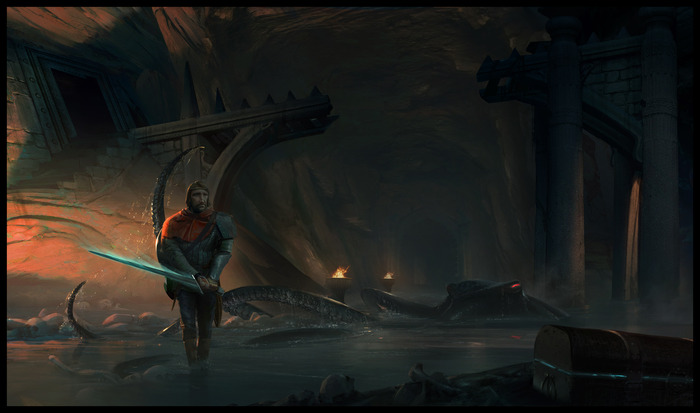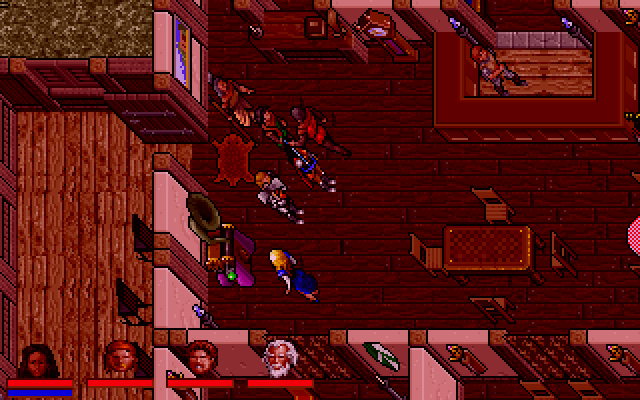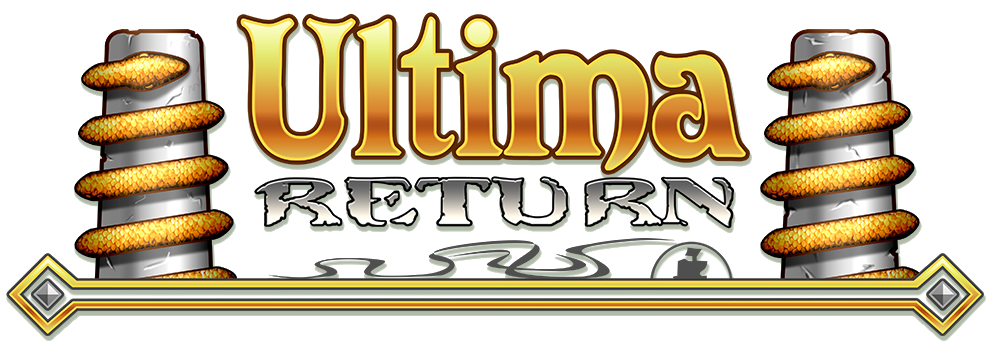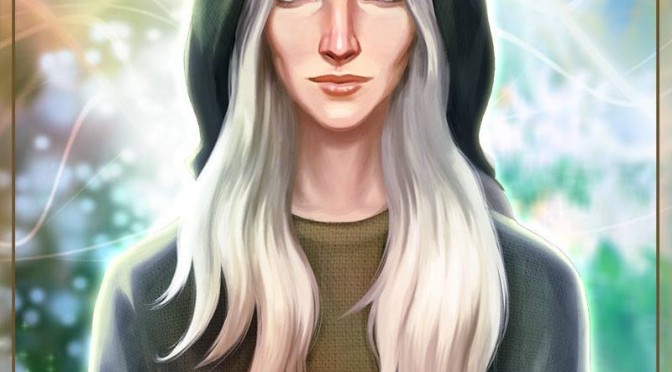It’s been many long years since this website was updated.
And it’s time to come to the logical conclusion : at this point in time my Ultima fan project “Ultima: Return” is essentially dead.
The engine switch which made us start from scratch and also coincided with the diminishing of free time for all of us essentially took its toll on Return and the game has been going nowhere for years. While I hope to return to it in some form, some day, I should stop to pretend it is still going anywhere at this point.
As an apology, I wanted e to share some aspects of the game with my fellow Dragons, in term of design and gameplay ideas of how the game would have played, but even moreso in term of Serpent Isle lore and how the world evolved since the original game.
I’m not spoiling the game’s plot at this point in time, because as I said I still hope we can “Vas Mani Corp” it someday.. but sharing some of the background feels fair, especially as I never really got to decide how much we would have shared before release.
So the core of the story takes place over 200 years after Serpent Isle. Taking into account Ultima IX’s 200+ year timeframe as well, it takes place roughly a couple decades after the end of the series. It’s a time of peace in a Britannia united under Lord British with remaining Wyrmguard renegades no more than history. And as is Britannia seems poised to live a New Age Enlightenment, it feels the right time for Shamino (who ever since coming back to Britannia, has always felt the draw to come back to his former land) to start an expedition to Return to the Serpent Isle, an area that has become source of myths and legends in Britannia.
The player is a member of that expedition. At least for the main game. The Prologue which we were focusing on was set a couple decades after Serpent Isle on the Isle of Claw. In that prologue you were playing a different character who was on a Britannian ship who got lost in a storm and ended up in the Serpent Isle, crashing on the Isle of Claw. It could have lead to hinting to some future events in the Serpent Isle but also setting up important lore for the game… but I digress.
So of course the first thing I’ve done when starting up on Ultima: Return is set up everything that happens over these 200 years and as it turns out: a LOT happens. As you’ll recall at the end of Serpent Isle most of the world’s population is left for dead, killed by the Banes of Chaos, but it still had to rebuilt and stronger that before if I wanted to make a game out of it! So for Return’s canon I decided “only” 3/4 of the population had died, during an events that was to be called the “Age of Doom” in history books. Some of the deceased were brought back as well by the Monks whenever possible though it was essentially too little, too late… a fact that would also create issues into what would become of Xenkan Monks.
Shortly afer Serpent Isle, Shamino and his Britannian friends eventually returned to Britannia (I never set out the specifics of how – it was to be a fanfic called “Return to Britannia” – though it involved Erstam and summoning the Serpent Pillars) but they lived another adventure alongside the persons who would become the two major figure of upcoming Serpent Isle history : Cantra & Wilfred.
And so this is what happened with Wilfred. And he was an ass in Serpent Isle for sure, but I liked the idea that adventuring with the Avatar made him mature enough to become a better man, a GOOD man… which would in turn ironically be his undoing.
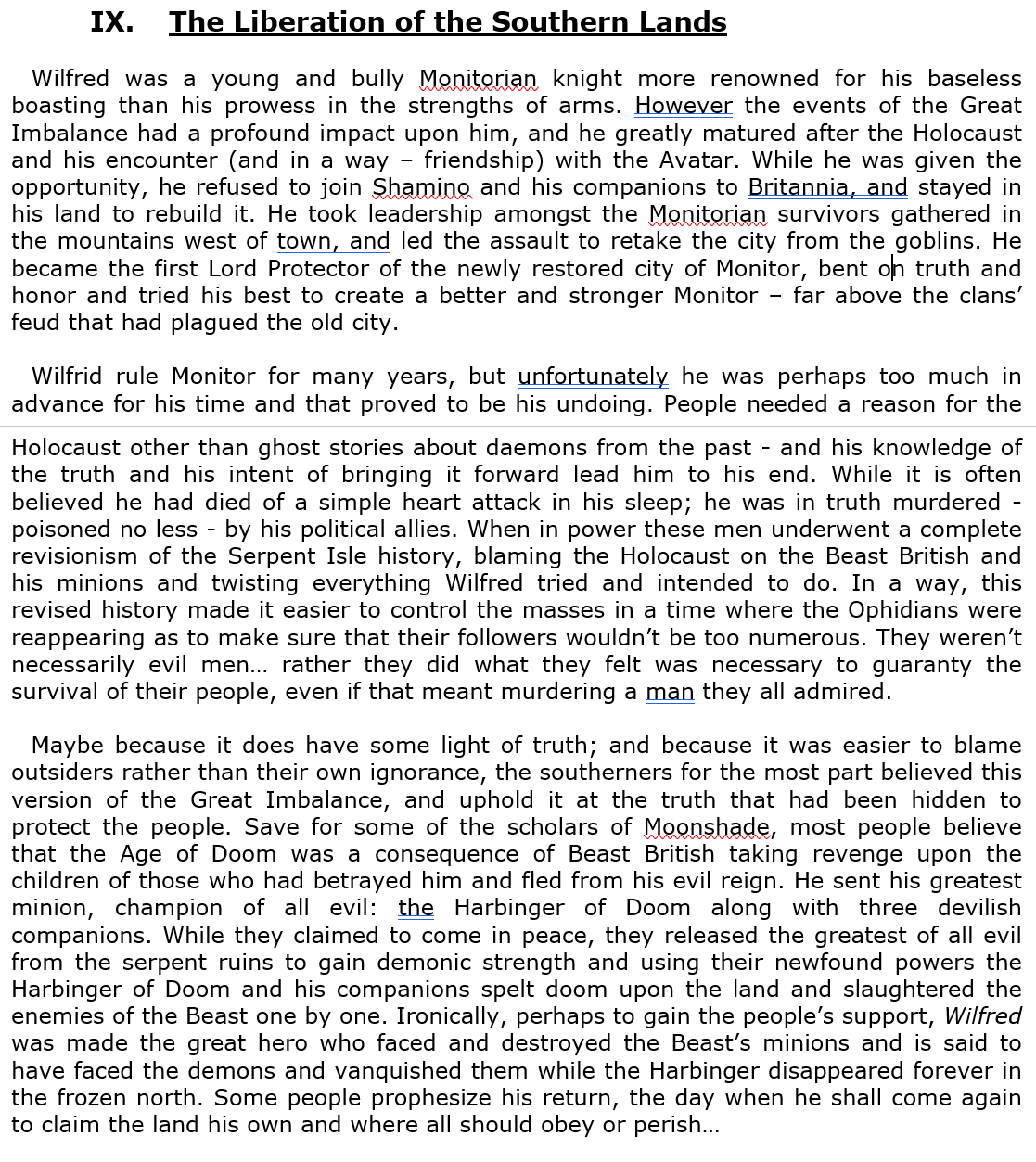
Good ol’ Beast British! It would have been easy to put that under the rug and just have Monitorian society get on with the truth of it… but it would have felt TOO easy perhaps. And I rather liked the the idea of a Monitorian society that had evolved into a good, united and honorable society… but based on a lie. And which would bring the player into a conflicted view as Britannia : should they say who they are or lie about it ? Should they unleash the truth at the risk of destroying Monitorian society…. or instead preserve that society even if it misrepresent their homeland ? That is the sort of moral issues I wanted to bring (And I haven’t even mentionned how Gorlab fit into this…)
But the most important aspect of the history of Serpent Isle was Cantra. I think that as with many fans I was always captivated by Cantra in Serpent Isle. She’s one the first person you meet, immediately gets friend with the Avatar, and made enough of an impact that I remembered seeking her after the Knight’s Test to tell her about… dissapointed that she was nowhere to be found.
And she gets thrown into this tragic story, serving as a host for the Wantoness Bane, getting killed by Batlin, resurrected by the Monks but crazed… and remained uncurable because of a bug in the game. The annoyance of all Serpent Isle fans ! Especially as based on these doctored screenshots on the back of the box, I expected she would turn into a companion…
(Now, of course Return considers the Avatar DID cure her.)
But that also gave her a connection to the Great Serpents nobody else on the Serpent Isle had after the Companions left and I just KNEW she had to be an important figure in the isle’s history and ever since I dreamed up the first premise of “Return to the Serpent Isle” 20 years ago, she was always a major character in it. You can even say in a way that Cantra was the reason I wanted to write and tell this story.
And first I was to share this excerpt of words from Cantra as she spoke to Shamino from my Return to Britannia fanfic which I felt sums up well the mentality of the character after all she’s been through.
“It was not your fault, neither you or your friends. You shouldn’t feel guilty for what the banes have done when they possessed you and your friends. I was possessed too; I know you lived every second of it…But it wasn’t you. I understand your feelings. But the truth is: it was our own fault. Our forefather settled centuries ago on these shores. And yet… never did they once try to understand the mysteries of the Serpent Isle; they only sought them as a way to increase their own powers. They were too involved in their own intestine wars to even care about the land they settled in. Even I… a few month ago, I was but a little girl with no other desire than to follow the footsteps of my father in the Way of Arms and fight the goblins, and with little knowledge of what laid outside the walls of Monitor. And for what? Now everything our ancestors built has been reduced to ashes, by an ancient evil buried within the lands that none of us was even aware of. Because we were fools. All of us. You and your friends didn’t cause the destruction of this land. You saved it. Never forget that.”
And I think you might understand an upcoming point of conflict.
In any case, to me it was obvious: she had to be the next Great Hierophant and rebuild a new Ophidian society who’s learned from the mistakes of the Old Ophidians and of New Sosarians.
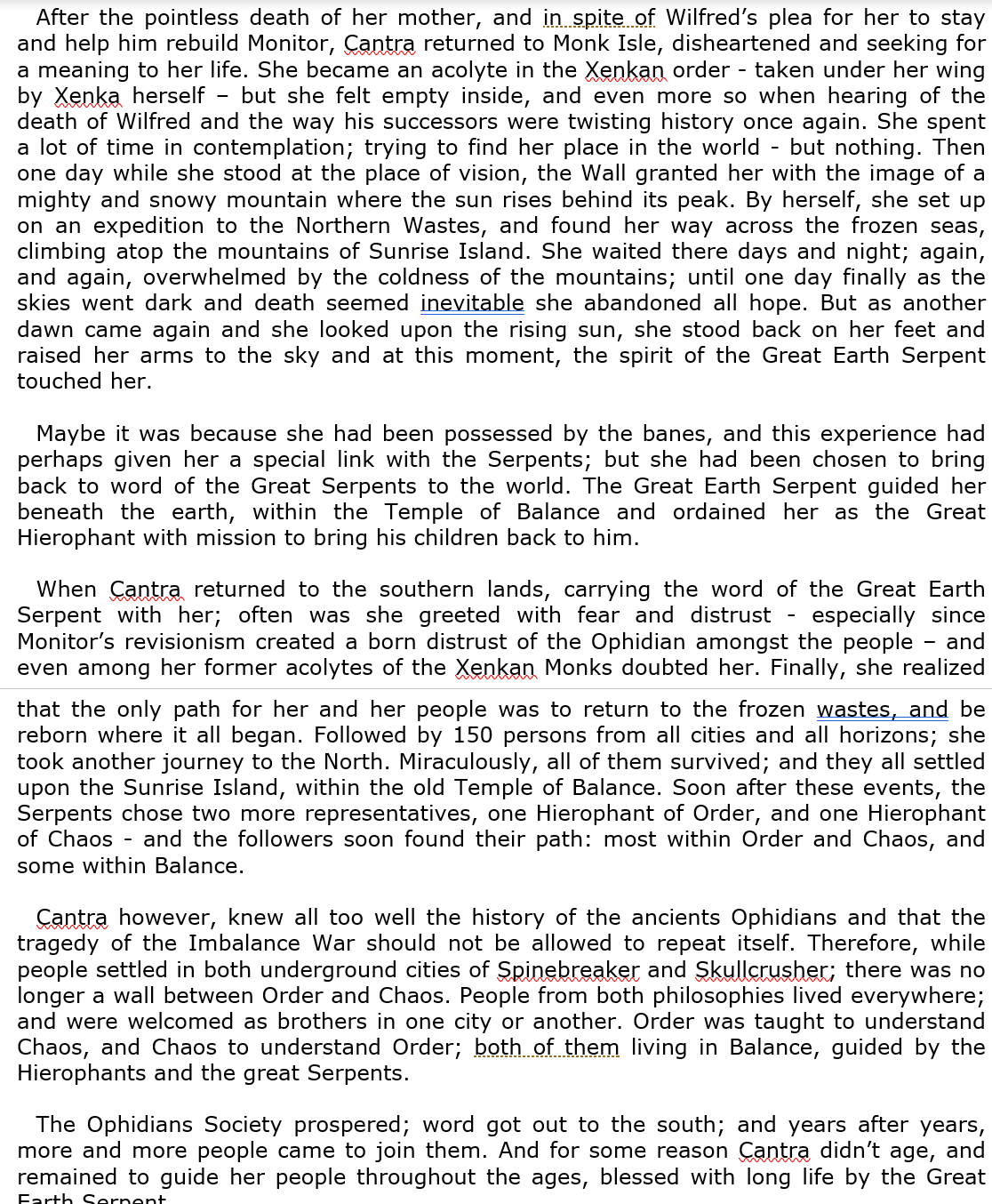
So as you can see we have two prospering distinct societies on the mainland : Northerners and Southerners with one major point of difference, one society has perpetrated the lies of the past, the other has not.
Actually I say two but we had actually three socities… because there was also the case of Moonshade. And Moonshade… boy there is a lot to be said.
One thing I’ve always found amusing but also very telling in post-Bane Moonshade is how Torrisio (whom we all know as the selfish bastard he was who only care about Magocracy and his open disdain for Mundanes) just moved in the MageLord’s palace and made himself at home. Because it felt so right for his character.
And so that lead to a major point in Ultima Return lore and the creation of another major figure : Torrissio, which DID decided that he WAS the new MageLord and with the city in shambles had nobody who could oppose him. Or so he thought.

But of course as you would expect, it didn’t stop there and it grew deep in my mind. And as we were getting about a century after Serpent Isle as society was well rebuilt already… Torrissio came back with a vengeance and he essentially became the Mondain figure of this land and unleashed : THE AUTOMATON WARS.

After this war, formal relations were established between Ophidians and Southernerns, with Moonshade still being on its own but rebuilt as a City with a focus on Truth. The world was then at peace for another hundred years and everything seemingly fine… until that moment 20 years prior to the beginning of the game, where Ophidian cut all contacts with the rest of the Land and closed the Serpent Gates.
And this is how the Serpent Isle would have been on the whole as the player arrived : defined through the regional description of existing cities just to give an idea of the geographical/political situations, much like they would be described in a potential manual
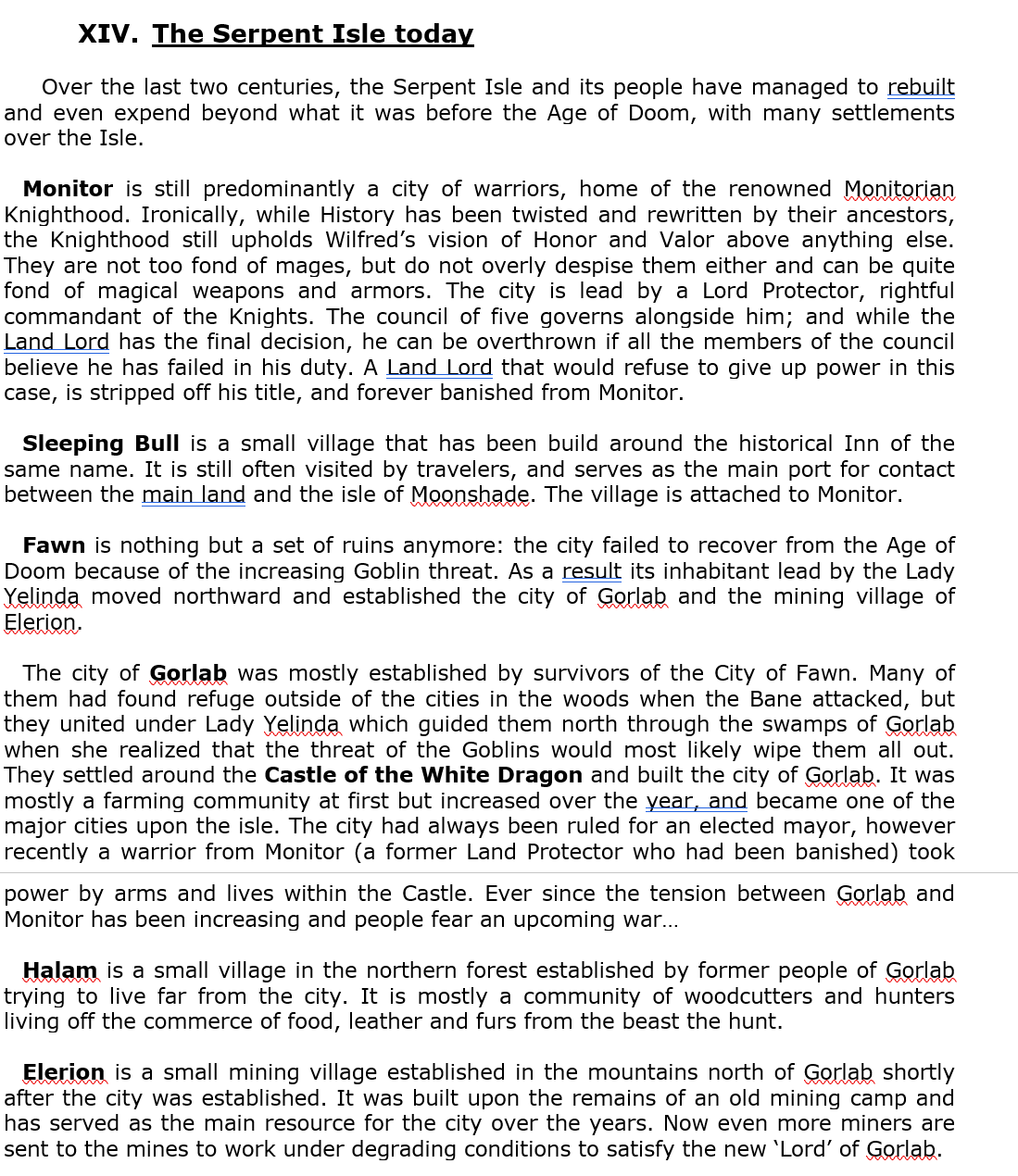
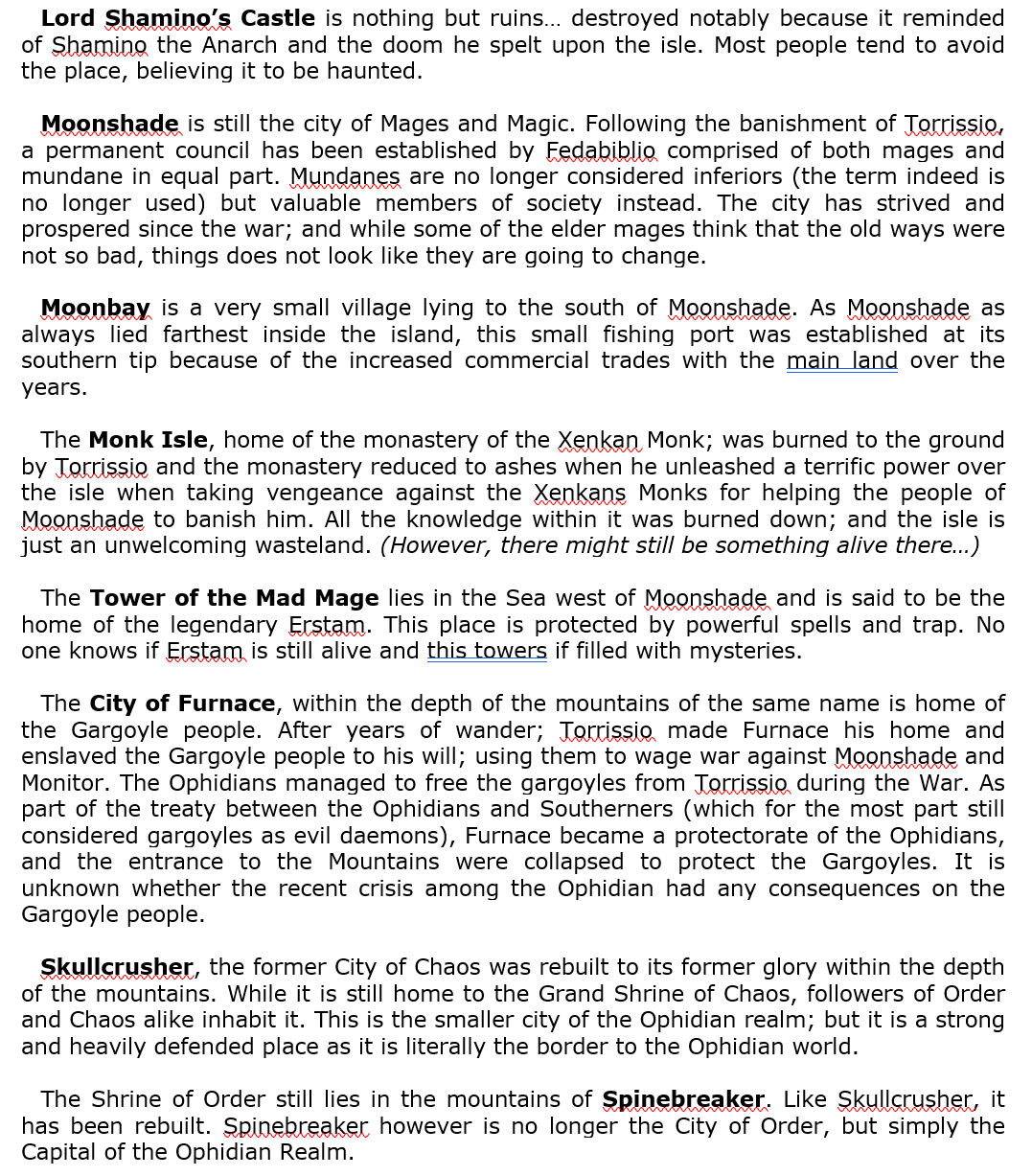
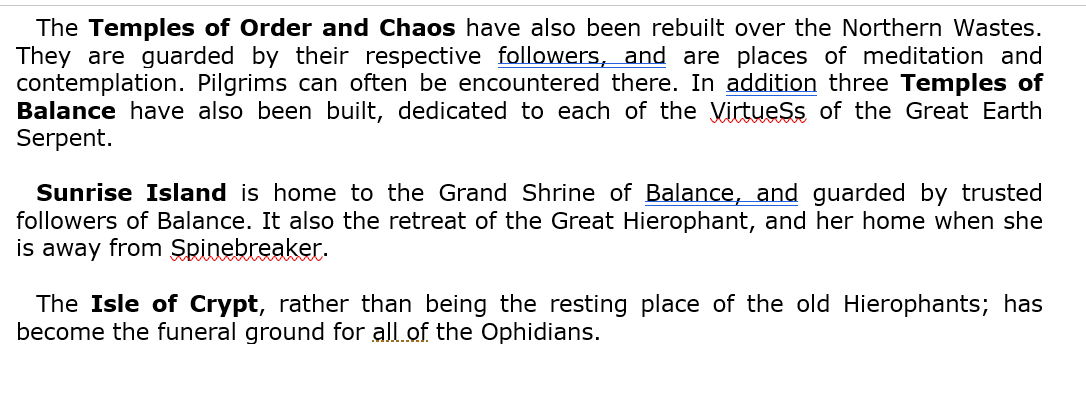
One point of note is that this is an earlier version of the doc and some aspects changed over time. For instance we kept going back and forth as to whether or not Fawn should be rebuilt or not. Same with Monk Isle. So here is for example descriptions for Fawn in the latest revision :
Fawn remained a set of ruin for a long time, having failed to recover from the Age of Doom because of the increasing Goblin threat. As a result its inhabitant lead by the Lady Yelinda moved northward and established the city of Gorlab and the mining village of Elerion. Following the Automaton war however, the city was rebuilt as joint effort by Southerners and Ophidians and remains one the rare places on the Isle where both societies live together. Fawn also houses one of the Ophidian Temple of Balance.
And you can see the rationale here : as it creates kind of unique society which has both Northerners and Southerners. and thus created more interesting approach. The main concern being about ressources to build it…
It’s the same thing with Moonshade, and it also gave a good reason to have Temple of Balance in the South for obvious Gameplay reasons
The Monk Isle, home of the monastery of the Xenkan Monk; was burned to the ground by Torrissio and the monastery reduced to ashes when he unleashed a terrific power over the isle when taking vengeance against the Xenkans Monks for helping the people of Moonshade to banish him. All the knowledge within it was burned down; and the isle became an unwelcoming wasteland. However some surviving monks along with ophidians resettled the Isle after the Wars, and it now houses the Temple of Harmony.
This is essentially the situation in which the player would arrive on the Serpent Isle on the isle, starting at the Isle of Moonshade which would have consisted the first Chapter of the game (essentially because it’s a self contained region, it was to make a good starting point before opening up the rest of the land and also would also have served as a good way to release an “Episode” of the game).
Note that is not ALL the lore of the game because as development went underway, I went back even further while working on the Prologue and the mysterious Catkin living on Claw Isle. But the one aspect that influenced it quite a lot was when the Ultima Codex got a hold in the complete infamous “Bob White Plot” of Ultima IX. While a lot has been said about the differences in Ultima IX storylines, the one aspect that compelled me about this plot is how it essentially created the Mythology of Ultima by going back in history beyond what we could ever imagined. And I knew it would be criminal not to acknowledge and use it.
In essence if you’ve ever read all the lore and background about the Ultima and the Time Lord and their war against their Avatars of Darkness ? You can consider it to be canon for Ultima: Return.
But I went beyond this and adapted it the Serpent Isle and I went way back in developping the own mythology of Serpent Isle, to the point of describing how and why the Great Serpents existed in the first place, how and why the Serpent Pillars were created, why magic exists and much more. To be fair not everything would necessarily have been in the game but it felt important to lay it down either way.
Still, for the fellow fans who have come this far in this long post, I felt giving some snippets would be nice :
This war was not without consequences and unbeknownst to them, the Ultima and their siblings tore a hole in the fabric of the universe, gradually leading all creation to the brink of destruction. Focused on their intestine wars which were already endangering the universe, the Ultima were too blind to see the danger they had unleashed.
But the Ultima were far from being the only intelligent lifeforms in the universe. And while many were oblivious to this gigantic war, some were not.
Amongst those, there was a race solely know as the Ophidians – known before all for their balance with nature and who viewed the universe in a very different way than humans. They were a race of snake people living on one of the many worlds hurt by this war, who learned to discern and harness the signs of the Ultima and their siblings.
For as the war was going on, the Ultima unknowingly left their mark upon the multiverse. As a resonance of their existence and their life, the Void filled with magical ether while in their death they left bloodstains of their passing in the guise of huge veins of Blackrock on multiple worlds. Ether and Blackrock represented the two most basic opposite forces of the universe, a mark of life, and a mark of death, both impregnated with a trace of the Ultima power they had harnessed from the fabric of the universe. And as opposite they could cancel each other – for Blackrock could only be modeled through the help of magic, while magic could only be blocked out altogether by Blackrock.
Over the course of their existence, the Ophidians learned to harness the Ethereal energies in the Void and to craft Blackrock for their own use. But as the wisdom of the Ultima was now focused on war, the Ophidians had all the time they needed to further their understanding of the universe. As such they gradually became aware of the Ultima and the war they were plunged it, and they eventually discerned how this war and the Ultima Power they wielded was tearing a hole in the fabric of the universe. As they became aware that the Ultima themselves took no notice of the consequences of their war, the Ophidian agreed on all count: they had to patch this hole before it was too late for the universe
And this added lore also lead to massive change is some of the story’s aspect (notably in term of Torrissio’s goals and ambitions and powers), though for the better as it lead some problematic aspect of the plot to finally gel together properly. So this was a win/win creative-wise.
Regarding all this I just posted I will point I was always uncertain as to how much would be reveled before the game. This is the sort of things that could have been in the “manual”… or not. I was never set about the POV for the manual, hesistating on having a Serpent Isle point of view (likely an Ophidian one) or a Britannian one written by Shamino which would have reserved the surprise of how much the Isle had changed
Still this is all for lore. Story wise I will just say some Serpent Isle characters would have returned but with one rule : only magic users are long lived. Though I had mapped out how every surviving Serpent Isle character ended after the game…
And now I will share more on the design side and how we wanted the game to play.
Design wise I wanted to get back to traditional core Ultima aspects but with one twist: we would focus on the Nine Ophidian Virtues rather the Britannian ones. As such we would have nine levels, and nine characters classes !
Character creations would have followed Virtue Questions, but built upon Ophidian Virtues instead, first with questions between Order Virtues, then Balance, then Chaos… and a final question between Order/Balance/Chaos that would have defined the final Class. Here is an exemple :

My view about this was that while Serpent Isle was basically telling us “Balance is the right way” I wanted on the other hand to go… “Well… Not necessarily” and Virtue choices to feel like there aren’t necessarily any good or bad choices. Balance is, well, balanced… but Order and Chaos can be positive as well just like Balance can be mistaken.
I also sometimes revamped some traditional Britannia questions into Serpent Isle ones. These questions would likely have had a more rewrites before release though.

Still each virtue would have lead in a character class :
Ranger (Ethicality)
Watcher (Discipline)
Mage (Logic)
Mender (Tolerance)
Swashbuckler (Enthusiam)
Minstrel (Emotion)
Serpent Guard (Harmony)
Knight (Dedication)
Monk (Rationality)
In Ultima tradition classes would have built around three templates : Warrior, Mage and Rogue, with each classes existing within one or multiple templates. Classes, though, were essentially a starting point giving you your bases stats and skills but would not be a “prison” for the player, so you would be free to continue with the skills given to you, or learn other things.
In that aspect I took influence from Ultima Underworlds, except that Skills were influenced by Ultima IX in only having four levels but with each level having a noticeable impact. There was plan to have 25 Skills split into four categories : General, Combat, Magic and Adventuring. At each level you’d get a set amount of skill points and you’d then need to find trainers to learn a new skill from them. And some case this might also require to earn their trust or do a quest. You would not have been able to max out every skills over a single character either. And levelling? I wanted it to happen in Shrines/Temples like in old Ultima games, which is why later land revisions added Balance Temples in the Southern lands and I considered to have Truth/Love/Courage Shrines or equivalent in the Southern Cities.
Fun trivia bit is that Britannian characters would have had Britannia classes. So Shamino would have been a Britannia Ranger class… but not the same one as the Moonshade Rangers. Companions would have had a more limited approach to development as well because my view was “You’re the player so you can learn the skills and stats you want… ” But your companions are set existing people with their own lifes and view of life so their skills would have been set and limited to the job they wanted to have.
To be back to Virtues I wanted the game to have a strong quest focus around them : essentially any major quest was to have three resolutions. Order, Balance, and Chaos. And sometimes a fourth Evil one. That doesn’t mean every quest would have been a Virtue, but rather they would have illustrated how these virtues are a part of life and how the way you solve it, no matter if it felt right to you, would also tie to a Virtue.
Ideally there would have been a counter and karma following, but I always feared it might be too big and complex in scope for a short fan project. Still I was proud in how I wrote one of the quests in the Prologue and it felt to me that it proved it was a workable system.
The idea was also that each city would essentially have a “city plot” to solve, with an overarching story-line revealing itself, though it would become more linear in the later (more but not totally). To further there would have been a reputation system tied to cities/factions, with the need to increase it to futher some aspects and stories, somewhat like how Gothic and Risen games handled it.
I also wanted the game to be pretty hardcore in term of survival but I had already outlined here. Altough this would have been an optional default hardcore more which could have been turned off for people who wanted a more strealined adventurous experience.
Another aspect I wanted a strong focus was dungeons : I wanted to take inspiration from Ultima IX notably in term of having variety and different sort of puzzles and things to do into dungeons, and not just have them be hack’n slash romp like in most RPGs. For instance one of the dungeons in the Prologue was all “lore through text” and puzzles and logic to get to the next step, and would aslo require the use of a “Solo Mode” much like Ultima VI had to have your characters do separate things in separate parts of the dungeon.
This aspect would also have existed in what I would call “boss battles” against important enemies/monsters. In Ultima tradition (think back to the Triad of Evil or even Ultima IX) some of those you could not defeat by simply hitting them but by using smarts as well an elements around you.
Oh and charcter death would have led you to be teleported to a specific place and ressurect with a small % of XP loss, much like in older Ultima games, though as outlined in the “hardcore” dev docs, companions wouldn’t have died but gotten injuries instead.
In any case that’s the ghist of what I can think of to share, though I’m sure there would be a lot. I’m not sure if anybody will read through it all but if you have : thank you, and if you have questions or comment fell free to ask.
And really thanks to all the people on the team, whether you were there from the start or came and went, who worked on it and tried to make it a reality over the last decade.
Here’s hoping we can get back to it in some form someday 🙂

